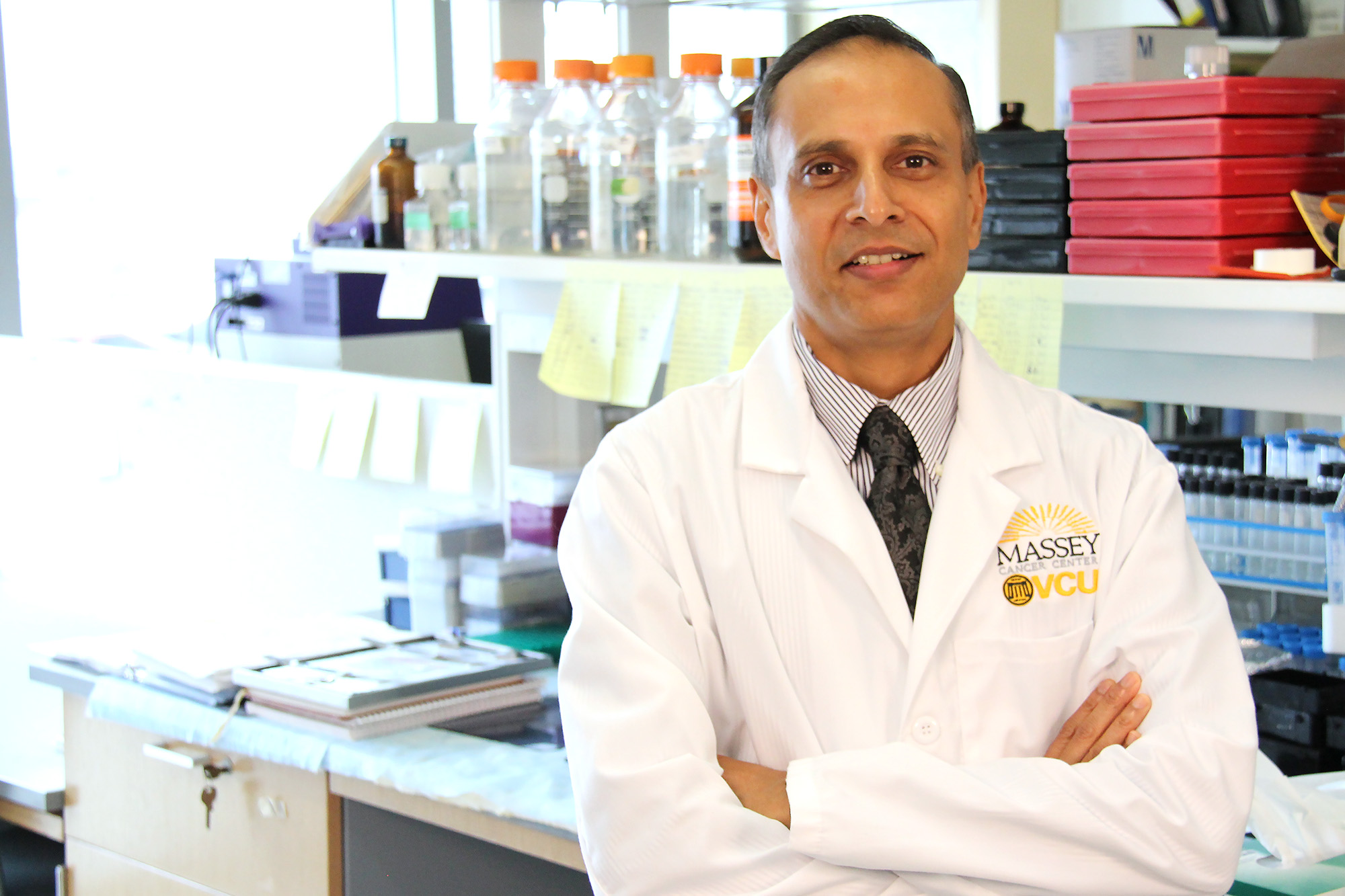Latest News
Research & Innovation
Scientists target the tumor microenvironment to shut down liver cancer
Jan 15, 2019

Over the course of a decade, VCU Massey Cancer Center researcher Devanand Sarkar, Ph.D., has uncovered astounding new insights into the development and progression of liver cancer, identifying key genetic drivers and shedding light on unknown associations with obesity and inflammation. Now, he and his colleagues have set their sights on immune cells found in the liver called macrophages, and their findings could lead to novel treatment approaches.
In a study published in the journal Cancer Research, Sarkar showed that macrophages play a critical role in the inflammation process leading to the development of hepatocellular carcinoma (HCC), the most common form of liver cancer. By deleting a gene known as AEG-1 from liver macrophages, they were able to make experimental mouse models completely resistant to the development of HCC. Prior to this research, there was no known link between AEG-1 and macrophage activation.
“We have been developing therapeutic strategies targeting AEG-1 in the tumor cell, but these new results suggest that we should also target the gene in the microenvironment surrounding the tumor,” says Sarkar, who is the associate director for education and training at Massey, holds the Harrison Foundation Distinguished Professorship in Cancer Research and is a member of Massey’s Cancer Molecular Genetics research program. Sarkar also serves as co-director of the doctoral program in clinical and translational sciences with a concentration in cancer and molecular medicine, which is administered through the C. Kenneth and Dianne Wright Center for Clinical and Translational Research.
AEG-1 has been previously shown to be overexpressed in the vast majority of cancers, and most of Sarkar’s research has focused on how the gene impacts the biology of liver cells. The tumor microenvironment consists of the surrounding blood vessels, immune cells and other molecules that surround and interact with the tumor. This environment interacts with the cancer cells, which can manipulate it to support cancer growth and metastasis.
After deleting AEG-1 from liver cells, Sarkar’s team found the mice in his experiments were only partially resistant to HCC. However, a novel mouse model in which AEG-1 was deleted from macrophages was completely resistant to HCC development. This showed that AEG-1 helps regulate how macrophages respond to stimuli, and that therapeutic strategies targeting it may prevent development of liver cancer.
“We have been developing nanoparticle-based therapies that target AEG-1 in liver cells, and we feel this is a very promising new discovery in support of that approach,” says Sarkar. “Our next steps will be to develop a nanoparticle that targets AEG-1 in macrophages. These two approaches could be a very potent anti-cancer combination.”
Sarkar and his team have been working on developing a nanoparticle-based therapy that specifically targets receptors found on the surface of liver cells and delivers siRNA, small molecules designed to block the expression of genes such as AEG1. They now plan to develop macrophage-specific nanoparticles that can be used to better evaluate the feasibility of this therapeutic approach.
Sarkar collaborated on this research with Shobha Ghosh, Ph.D., associate chair for research in the Department of Internal Medicine at the VCU School of Medicine; Paul B. Fisher, M.Ph., Ph.D., N.A.I., Thelma Newmeyer Corman Endowed Chair in Cancer Research and member of the Cancer Molecular Genetics research program at Massey, chair and professor of the Department of Human and Molecular Genetics and director of the VCU Institute of Molecular Medicine at the VCU School of Medicine; Mikhail Dozmorov, Ph.D., member of Massey’s Cancer Molecular Genetics research program and assistant professor in the VCU Department of Biostatistics; Jolene Windle, Ph.D., Irene Shaw Grigg Distinguished Professor in Genetics Research, co-leader of the Cancer Molecular Genetics research program and resource director of the Transgenic/Knock-out Mouse Facility at Massey and professor in the VCU Department of Human and Molecular Medicine; Mark Subler, Ph.D., assistant professor in the VCU Department of Human and Molecular Genetics; and Zhao Lai, Ph.D., from the University of Texas Health Science Center in San Antonio.
This study was supported by the National Institute of Diabetes and Digestive and Kidney Diseases grant 1R01DK107451-01A1, a Massey pilot project grant and, in part, by Massey’s National Cancer Institute Cancer Center Support Grant P30 CA016059.
Written by: John Wallace
Related News
Research & Innovation
Robert A. Winn Excellence in Clinical Trials Program Annual Convening highlights long-term, dynamic public-private partnershipNov 24, 2025
Research & Innovation
Commonwealth of Virginia Cancer Research Conference unites cancer researchers, students, and trainees from across the stateNov 21, 2025
Research & Innovation
Targeted drug could benefit pediatric and young adult patients with invasive soft tissue cancerNov 18, 2025

Get access to new, innovative care
Treatments in clinical trials may be more effective or have fewer side effects than the treatments that are currently available. With more than 200 studies for multiple types of cancers and cancer prevention, Massey supports a wide array of clinical trials.

Find a provider
Massey supports hundreds of top cancer specialists serving the needs of our patients. Massey’s medical team provides a wealth of expertise in cancer diagnosis, treatment, prevention and symptom management.
